Review for Gilgamesh: Complete Collection
Introduction
Why did I even buy this? It isn't because it was cheap, even though the prospect of picking up a series for under £15 usually lets my innate bargain hunter overrule any vestiges of good taste. It isn't even because of guilt, although I must admit that Gilgamesh was one of those shows that I caught on fansub first of all. Back when I first got a broadband connection, and the world of online anime was opened up to me, albeit without any of the companies that supply free and legal streams as they do now, my first inclination was to catch up on those shows that I had missed, and high on the list was Gilgamesh, released by ADV to mixed reviews. They were the sorts of reviews that encouraged an interest, but discouraged taking a chance on a blind buy. The viewing experience for Gilgamesh was hardly a pleasant one in the first place, fansub streams aren't noted for technical quality, and I had found the one fansub on the planet that was presented in pan and scan format! On more than one occasion, viewing a fansub has propelled me into buying the DVDs, but not this time, as I found that I didn't even like Gilgamesh all that much. It has an unappealing visual aesthetic to its character designs, it's downbeat, it's derivative, and it has an ending that amplifies all its flaws. I finished with the fansubs and decided that enough was enough, and quickly put Gilgamesh out of my mind. Except that it just wouldn't stay that way. Since I have watched it, it has insinuated itself in my subconscious, got under my skin, its visual aesthetic and gothic sensibilities have gnawed away at me, until quite recently, I found myself comparing other shows to it. You just don't get that worked up about shows that you purport to loathe, which is why I felt compelled to buy it and give it another chance. At least this time I'll get to watch it in widescreen!
Gilgamesh is the sort of post-apocalyptic thriller that will appeal if you are a fan of shows like Texhnolyze, with an emphasis on mood and atmosphere rather than an 'in your face' flash and bang. The 2003 anime series was originally released in single volume form in the UK by ADV back in 2006. This 7-disc collection was put out in 2008 as the waters closed over ADV following the collapse of the Sojitz deal, as Lace Distribution found itself trying to eke as much profit out of the licenses it had suddenly acquired, by releasing a legion of boxsets.
The middle of the 21st Century was supposed to be the gateway to a new golden age, as scientists gathered in the Middle East, conducting groundbreaking hi-tech research in the cradle of humanity. That research ground to a halt, when it became clear that the hazards of pursuing it outweighed the benefits. But one man, Terumichi Madoka, couldn't accept that. What followed was the greatest terrorist act in human history. Madoka, thereafter known as Enkidu, triggered Twin X, named as such because it happened on October 10th, 10/10. An energy wave enveloped the world, causing all high technology to fail. The computer based society collapsed, and wars followed claiming a significant fraction of the population. Those who survived the wars were further winnowed by famine and disease. And as a permanent reminder, the blue sky turned into a mirror reflecting the carnage on the ground, The Sheltering Sky.
15 years later, two children have a hard enough time eking out a survival when they are constantly pursued by debt collectors, looking to collect on the debt owed by their late mother. But the siblings are Kiyoko and Tatsuya Madoka, children of the most infamous terrorist the world has ever known. They are in greater demand than they can realise. The Countess of Werdenberg wants to recruit them into her Orga group. While the technological society may be a thing of the past, Twin X had one other effect, in that following the event, children began being born with abilities, infused with a strange power called Dynamis. Telepathy, telekinesis and teleportation are among their talents, and the Countess believes that Tatsuya and Madoka are similarly gifted. She wants to gather such talented children and use those abilities to protect humanity against Gilgamesh. And it's Gilgamesh that gets to the siblings first. Gilgamesh is a group of elegant beings with similar abilities that follow a rather different agenda. But they aren't human, indeed their true forms are monstrous to say the least, and directing their agenda is none other than Enkidu, Tatsuya and Kiyoko's father.
26 episodes of Gilgamesh are presented across 7 discs as follows.
Disc 1. Orphans of the Apocalypse
1. Les Preludes
2. Gräfin Werdenberg
3. Children of a Lesser God
4. Hotel Providence
5. Dynamis
Disc 2. Cage Without a Key
6. The Sheltering Sky
7. Dissonance
8. Adieu L'Hiver
9. In The Core Settlement
Disc 3. A Wake For The Undead
10. Saint Terrorism
11. Far From XX
12. Die Lustige Witwe
13. Pomegranate
Disc 4: Under A Blood Red Sky
14. October Project
15. La Blattaria
16. Nessun Dorma
17. Hammerklavier
Disc 5: As Truth Breaks Like Glass
18. Blue Zone
19. Orga-Superior
20. Tear
Disc 6: In The Soul Eclipse
21. Delphys
22. Heaven's Gate
23. Sacrifice
Disc 7: All Fall Down
24. Cleansing Flood
25. Conversation Piece
26. Gil Games Night
Picture
Gilgamesh gets a 1.78:1 anamorphic transfer, which is clear and sharp enough, once the usual NTSC-PAL conversion issues are taken into account. It isn't very colourful though, although that is a creative choice. Also a creative choice is the intentional grain applied to the flashback sequence at the start of the first episode; so don't go adjusting your sets. It's supposed to look that horrible. Actually horrible is the operative word when it comes to the look of Gilgamesh, a world leached of colour, a world mostly in greyscale, a world of shadows and monstrosities. Gilgamesh is very much described as a Gothic show, and the oppressive, chilling atmosphere that pervades the story certainly qualifies. It's a show of grotesques, not least in the Frankenstein labs of the odd scientists that we meet, and certainly not least in the gargoyle like monster forms of the Gilgamesh group that serve as the show's ostensible antagonists, but also in the general character designs. These are people drawn with broad strokes and thick outlines, thick lips and pallid features. Even the apparent femme fatale of the show, the Countess with her raven tresses and alabaster skin, on occasion appears more monstrous than alluring. Again, it's a deliberate creative choice, and significantly different from the usual anime character designs.
Gilgamesh is a relatively early 2D computer animation, dating from 2003, and that primitive nature shows. The characters don't exactly blend into the backgrounds, and on a couple of occasions in the first few episodes, instead of animating a close-up anew, they actually zoomed in, and the reduction in resolution became apparent. It's not all that animated a show anyway, with a lot of standing around talking, or moody tableaux. This is a show about atmosphere more than action, about mood more than motion. It gets away with it, but someone more attuned to current anime may find Gilgamesh lacking.
I noticed one frame of pixellation, 4:20 into episode 8 on disc 2, accompanied by an audio glitch.
Sound
You have a choice between DD 5.1 English and German, as well as the native DD 2.0 Japanese track. You also have a choice between translated English and German subtitles, as well as English and German signs only tracks, although for obvious reasons, I didn't sample the German track. I only had a taste of the English track, despite the lavish attention that it gets in the extra features. It's a solid, impressive audio track, with the added Surround dimension really working well with the show's sound design, giving the show's mood and atmosphere added depth. The dub is a typical ADV dub, although everyone is moody and speaking in undertones. It gets a bit much at times, and the Japanese dialogue track at least has a little more vitality and counterpoint to it.
As always I did prefer the Japanese audio, despite the simple stereo nature of it. It still provides an unsettling and awkward experience that matches the mood of the story. The opening theme for the show is as out of place as a theme song can possibly be, although the end theme is a little more appropriate. Far more effective is the dissonant and eerie music in the show proper, which really shivers the skin. I must admit that the music for the action sequences did sound a little familiar, and it was no surprise to find that the composer for the show was Kaoru Wada, who has also composed the music to Samurai 7. There is a whole lot of classical music too that very much fits the mood of the piece.
Extras
These are the original single volume discs repackaged, and the extras have been carried over as well. All that are missing are the contextual notes that were printed on the inside covers of the single volumes. The inside cover of this m-lock case does have an episode listing though. You get one disc on the inside front, two discs overlapping on the inside rear, and a hinged central panel that houses two discs overlapping on either side, four in total.
Gilgamesh was released during ADV's European phase, and these are tri-lingual discs. When you pop the discs in, you get to choose from English and German menus. The German versions play an anti-piracy ad before getting to the main menu screen, and quite obviously the text extras will be presented in German as well. Also notable is that the ADV trailers on each disc will be in English and German depending on which language menu you choose, and some of the German interpretations of ADV shows are well worth watching. They certainly 'get' Kino's Journey in the right way, as opposed to the English trailer that comes close to false advertising. Across the discs, the trailers that you will find include, Elfen Lied, Neon Genesis Evangelion: Platinum Edition, Full Metal Panic: Fumoffu, Kino's Journey, and Lady Death, Magical Shopping Arcade Abenobashi, Azumanga Daioh, Samurai Gun, and Full Metal Panic, Aquarian Age, E's Otherwise, and Shadow Skill.
All the discs get animated menus and jacket pictures. Because of the nature of the discs, the episodes play with the original Japanese credit reels at the beginning and end. But if you go into the extras menu, and choose Credits, not only will you get the traditional DVD credits screen, but you'll also be able to see a single generic German language credits reel, and the English language credits reel for each episode.
Disc 1
This is the lightest of the discs when it comes to extras, although it does have the highest episode count of all the discs. On here you will find the clean credit sequences, a 2-minute slideshow of Production Art/Sketches, and a 4-minute slideshow of Character Art/Sketches. There is also a preview of volume 2.
Disc 2
Here you will find much the same, including a recap of volume 1 as well as a preview of volume 3. The clean credits are here, the Production Art/Sketches slideshow lasts 1½ minutes, while the Character Art/Sketches lasts 2½ minutes.
Of interest on this disc is Revelations: In the Studio with Orga. This 17-minute featurette has the English voice cast that plays the Orga group, Britney Karbowski (Fuko), Alice Fulks (The Countess), Quentin Haag (Toru), and Andrew Love (Isamu), talk about the characters and the show. It's interesting to see how it differs for them from the usual anime, to the point where even the ADR sessions were altered to emphasise the show's atmosphere.
Disc 3
The basics are here again, including the recap of volume 2, and preview of volume 4, as well as the clean credit sequences. The Production Art/Sketches slideshow lasts 2 minutes, while the Character Art/Sketches lasts 4 minutes.
The big extra on this disc is the Whispers & Sex & Slices of Violence: Gilgamesh at the Alamo Drafthouse featurette, which runs to 36 minutes. For the midpoint of the show's English Language production process, the event was marked by a special screening in Texas, essentially a promo reel that showcased the work that had been done on the show up to that point, with interviews with the voice cast. It's an interesting featurette, but be aware that there are spoilers for later on in the series.
Disc 4
Once again we get the usual format of recap of volume 3, preview of volume 5, the clean credits, 4 minutes of Production Art/Sketches, and 4 minutes of Character Art/Sketches.
Also on this disc, you will find a Glossary of Terms section, which delves into the jargon of the show, the mythology and the science that infuses its themes. There are 37 text pages here, and spoilers as well.
Revelations: In The Studio With Gilgamesh is a 14-minute featurette, in exactly the same vein as the one on Disc 2, which this time gathers the English voice cast that play the members of the Gilgamesh group in the show.
Gilgamesh: A Buried Masterpiece is an audio commentary that accompanies episode 14, although it only really lasts 21 minutes. It's less a traditional commentary, than it is a spoken essay, as the various voice actors take turns in reading the story behind the show, relate the creator of the original manga's life, and the story behind the anime's lengthy transition from page to screen. It's a fairly interesting, informative, if dry and ponderous audio track.
Disc 5
Of course there is the recap of volume 4, the preview of volume 6, the clean credits, 4 minutes of Production Art/Sketches, and 4 minutes of Character Art/Sketches to be getting on with.
This disc also sees 31 pages of text offering more entries in a Glossary of Terms, although not all the information here is relevant or even useful when it comes to the show.
Revelations: A Gorgeous Puzzle continues the dry, ponderous commentary from the previous disc, although this time, they have edited together clips from the show to play in the background that are relevant to what is being discussed, rather than just playing the track over a random episode. This time there is more information about the 10 members of Gilgamesh, some of the additional characters in the show, and also some fascinating insight into the show's costume design. This featurette lasts 26 minutes.
Also lasting 26 minutes is Going, Going, Goth. It's a behind the scenes featurette at the Alamo Drafthouse event showcased on disc 3. Interviewer Marisa Kreitz gets the backstage gossip from the voice cast and some of the crew on the English dub of Gilgamesh. There's also a little extra goodness for some other of ADV's shows, and you can see clips of Ghost Stories and Fuccons as well. The cameraman does need to learn how to focus though.
Disc 6
As is typical by now, you get the recap of disc 5, and a preview for disc 7. The clean credits are here, and the Production Art/Sketches slideshow lasts 4 minutes, while the Character Art/Sketches also lasts 4 minutes.
The Glossary of Terms this time around is shorter, at just 18 pages of text.
There are three Revelations featurettes on this disc, with the first, In The Studio with the New Gilgamesh the longest at 30 minutes. It gathers the remaining voice actors that play the super-powered antagonists to offer their views on the show. In The Studio With The Mitleid Corp lasts 21 minutes, and offers more of the same with another batch of voice actors. Heaven and Hell lasts 15 minutes, and is another audio accompaniment, in which the voice actors comment on the representations of good and evil in the show. A lot of it is obvious, and redundant if you actually watch the show, but there are useful titbits of background information to listen out for.
Disc 7
Quite obviously, you only get the recap for Disc 6 here, and the clean credits once more. The Production Art Gallery offers two 4-minute slideshows, which play one after the other. And there are 15 pages of text in the Glossary of Terms.
You get the Japanese promo video for the show, which at 7 minutes is exactly what it purports to be.
Revelations: Final Secrets, is another audio commentary type presentation, with the voice actors reading from a prepared script, discussing the few loose end aspects of the show as it comes to its conclusion. This lasts 18 minutes, and is again played against appropriate clips from the show.
Dark Diary: Lost Memories is ADR director Steven Foster's journal, brought to audio life as he reads out his entries concerning the production of Gilgamesh, recorded meticulously, if profanely over a period of several months. It runs 35 minutes in total, and plays against the first episode, and the first half of the second on this disc. There is a fair bit of insight into the production process, and it's worth bearing with the profanity to glean the informational nuggets.
The Music of Gilgamesh also comes to around 35 minutes. The theme song, the incidental music from Kaoru Wada, and some of the classical music in the show, is set to appropriate bits of animation, with captions for each piece, allowing you to appreciate the music without any of the pesky dialogue or sound effects.
It looks like a hell of a lot of material put together for a series, let alone something as obscure as an anime series. It's not really. The voice actor featurettes are the same thing, over and over. That Gilgamesh has such an extensive cast allows for the profusion of interview material, but when you are asking the actors the same questions, it isn't long before you start getting the same answers. Yes Gilgamesh is dark, yes, it's gothic, it's sexy, it's twisted and so and so forth, over, and over again. The other variation is the audio commentary type featurette, where voice actors read from a prepared script about various aspects of the show. Most of this stuff is pretty obvious if you actually watch the show, and doesn't really bear repeating. Occasionally you might hear an unexpected point of view, but the only really interesting stuff in these chats is when they talk about the production, or the background to the story, rather than what is happening on screen. There is a whole lot of redundancy in the featurettes, and in the case of Gilgamesh, less would have been more. It's also best if you leave the extra features until the end of the series, as there are a few spoilers in there that might diminish your enjoyment of the show.
Conclusion
They don't make shows like Gilgamesh anymore. It's the recession and the downturn and all that. Nowadays, the anime industry has retrenched and contracted, is sticking to safe, predictable, what sells, and what appeals to its core demographic. We're back to the era of cute girls and giant robots, and the world is a slightly less interesting place for it. But back in the mid 2000s, the streets of anime were paved with gold, money was everywhere, and anime was poised to be the next big thing. You could take chances, invest in new ideas and get away from the established tropes. There was room on shop shelves for depressing, nihilistic, downbeat, dark, Gothic and gritty stories. Shows could be driven by story and not by cliché, and fans of said storytelling were spoilt for choice when it came to anime. You wouldn't get a show like Paranoia Agent, Texhnolyze, or Ergo Proxy today, and you certainly wouldn't get a Gilgamesh. Of all the shows that I have seen, it is perhaps the darkest of the lot, set in a oppressive, unsettling, post apocalyptic world, populated with characters that are, at their best, venal, selfish and un-likeable, and at their worst, utterly reprehensible. The bad guys are worse. Have you ever had the feeling of someone walking over your grave? Imagine feeling that way for over 10 hours. That is Gilgamesh.
It is a tantalising story, a compelling if chilling view of the future, combining ancient mythology with science fiction, and touching on contemporary issues to create a unique vision of the future. Gilgamesh is set in the middle of the 21st Century, after the collapse of a technologically advanced society that had apparently conquered most ills with the use of genetic engineering and stem cell technology. That's a thorny enough issue as it is, with science and ethics often at odds into how such technology should be used. Then there is the Twin X incident, a terrorist attack that throws the whole world into chaos. It's called Twin X because of the date on which it occurs, 10/10. Coming so soon after 9/11 and the Twin Towers attack, the allegory is certainly pointed, especially as Twin X originates in the Middle East, Uruk, or rather Iraq. It harks back to the oldest story in the world, that of the god king Gilgamesh who sought immortality. In the show, his tomb is found in Iraq, but the paranormal incidents associated with that tomb gather the worlds' scientists to the location, where archaeology becomes cutting edge science, when a cavity beneath the tomb is shown to open out into an alternate dimension. But it's one of those scientists that trigger Twin X, even after he warned of the dangers of the research.
And what a world Twin X creates. We follow the story of siblings Tatsuya and Kiyoko Madoka, fifteen years after Twin X, when the advanced civilisation fell with the advent of the Sheltering Sky. An electromagnetic phenomenon seals the sky away from the surface, replacing it with a mirror. Look up, and you just see the land reflected, the lights and towers of the city in which you live, or the constant dull, overcast greyness of a world deprived of natural light. The stars are gone, and with them it seems the hope and vitality of humanity. With the Sheltering Sky also comes the end of the information age, as all computers and advanced technology stop working. Wars ensue, and what remains of humanity is whittled down by famine and disease
Yet even in this world, cast in the lowest level of hell for its inhabitants, there are factions vying for control. There's Gilgamesh of course, the group led by Terumichi Madoka, a.k.a. Enkidu, the man who brought about Twin X. He remains an unseen figure for most of the show, and it's his proxies that we encounter first and foremost. The ten members of Gilgamesh are monsters in human form, apparently raised from ten experimental subjects from the Uruk research. They are comprised of antimatter and possess supernatural abilities, clad in form fitting leather, mysterious, forbidding, and determined to advance Enkidu's agenda of finishing what he started with Twin X. Opposing them are the Orga group, led by the Countess. She was the only survivor of Twin X, and she is determined to stop Gilgamesh. To that end, she has gathered children born after Twin X, children who have the same supernatural abilities as Gilgamesh, in order to fight the monsters. Yet she has her own history with Enkidu. Finally there is the Mitleid Group, whose chairman first invested in and drove the Uruk research. They want to annihilate Gilgamesh, and restore the world to the way it was, although they aren't exactly of a piece when it comes to figuring out how. Dr Enuma, a former Uruk researcher intends to remove the Sheltering Sky by technological means. Heir to the group Kazamatsuri is more violently opposed to Gilgamesh, and by using pre-fall gene technology, is creating an army of weapons to defeat the menace, all while the chairman Yuki clandestinely plots and schemes.
And into this maelstrom of opposing forces and motives are thrown Tatsuya and Kiyoko Madoka, sought after by all three groups, although by Gilgamesh most of all, yet persecuted for being the children of Terumichi Madoka, and saddled with the debts and obligations of a drunk and neglectful mother. Gilgamesh finds them first, but it's the Countess and the Orga group that comes to their rescue. Some rescue! The Countess winds up buying the siblings, by paying off their debt, leaving them obligated to her. The reason why is obvious, as Tatsuya has the same supernatural abilities as the other Orga children, while as the son of Enkidu, he becomes a significant lever to have. But at the same time, for Kiyoko, who has none of these powers, it's an obligation that quickly rankles, not least for the perceived wedge between her and her brother, with whom she has been close since childhood. It isn't long before she rebels.
Gilgamesh is replete with ideas and concepts, storylines, characters arcs and plot threads. Some of them certainly could have used more thought, as the antimatter Gilgamesh is just a throwaway idea that makes little sense in the 'real world'. But some of what Gilgamesh does with the idea of cloning and medical technology is a lot more believable, and downright unsettling. Then there are the biblical, mythological aspects of the show, the apocalyptic scenario, seeking immortality, cleansing the world through a flood, touches of narrative authenticity that really draw you in. Ironically, this is all one of Gilgamesh's weak points. It just tries to do too damned much. It has a nifty idea, explores it for a while, gives the viewer enough to get his teeth into, and then forgets about it. It builds up ideas and characters, entices and tantalises, but when it comes to executing those ideas it has a tendency to fall flat. Enkidu is a case in point. The father of Tatsuya and Kiyoko, he is the terrorist that caused Twin X, is behind Gilgamesh, and is plotting some unspeakable follow up that motivates Orga and Mitleid to act against him. But he is ever an invisible motive force. We only encounter him during the closing episodes, and it's probably the show's second biggest anticlimax. There's little actual understanding of his motivation, no resolution of the character arc. It's almost an afterthought. Similarly, the Mitleid arc that is so strong in the middle third of the show, just fizzles out by reducing the main character into a generic psychopath at the head of a genetically engineered army.
What also disappoints me is the absence of any truly likeable character, although given the tone of the show it would be hard to envisage one in this setting. Everyone is an antagonist here. Even the most innocuous of characters, Tatsuya, is thus simply because he reacts instead of acts for most of the story. He's a victim of forces rather than a motivator of events, and he's bland more than anything. If there is one thing to comment on, it's his closeness to his sister, a closeness that gets uncomfortable at times, although understandable given that the two are all each other have in the world. What makes it uncomfortable is the way that Kiyoko can use the intimacy between them to manipulate her brother. She loves him, but it's a stifling, overprotective love, and it's also selfishness on her own part. She doesn't want to lose him to the Countess and the Orga group, especially as the Dynamis power that they share is something that is alien to her. They even transfer that power between each other through physical contact, and as Tatsuya enters that world, he leaves his sister behind. And it's an awkward family that revolves around the Countess, who uses obligation and guilt, and whatever means come to mind to keep her children close. She sees that Kiyoko doesn't fit in, and quickly acts to distance her from her brother, treating her harshly and spitefully at times. Yet the Countess is attracted to Tatsuya, seeing his father in him, while she shares her bed with the youngest of the Orga children. It's a twisted, unsettling dynamic that exists in the hotel. These are supposedly the good guys of the show, but they are hard to like. Of course the tagline tells us that the line between good and evil blurs in this show, asking us which side we would choose. It turns out that my loyalties wavered not because of any moral issues, or plot developments, it all depended on which characters I happened to dislike the least at that moment.
Of course then there is the ending of the show, which I tend to categorise as a cross between End of Evangelion and Blake's Seven. There's nothing wrong with depressing and downbeat endings of course, it all depends on what motivates them, and whether there is a suitable catharsis, an emotional impact strong enough to justify such an ending. Not here, as the final revelation, the reason why all this has happened, is so trite and simplistic that it feels like a disappointment. On paper, and in terms of character, it makes absolute sense. You can intellectually understand why things happened the way that they happened. It's just that my visceral reaction to the ending of Gilgamesh is disbelief that I had to sit through ten hours and that was all that it boiled down to.
So when I think of Gilgamesh, what initially springs to mind are the show's many flaws. The characterisations are a matter of taste, but I would have preferred a little light to better contrast the dark. The missed opportunities with the story are a far more fundamental issue, and it would have been more satisfying had Gilgamesh done less, but accomplished more. And then there is that ending, which still rankles. But I have to weigh that against all that is positive about the show, the look, the feel, the atmosphere, the mood, the style, the gothic sensibilities, the adult nature of the storytelling, and the sheer sexiness and undertones of taboo that infuse this show, and I can fully understand just why it got under my skin the first time that I saw it, and why it is still an effective anime experience today. It is probably the most effective anime horror show that I have seen. But in terms of post-apocalyptic, edgy, Armageddon angst, I have to say that it is completely outdone by Texhnolyze, and if you have to choose, choose that. But there's no reason why you can't have both.

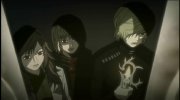

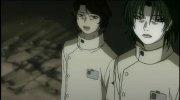
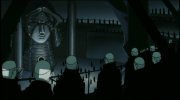

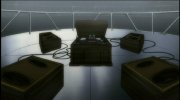
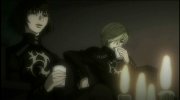
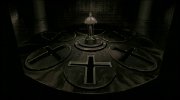
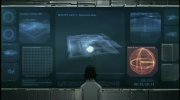

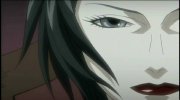
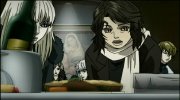
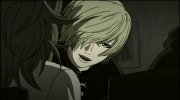

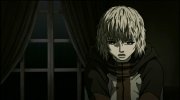

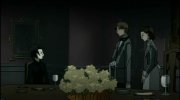
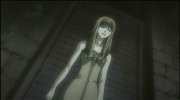
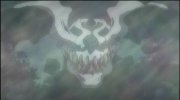
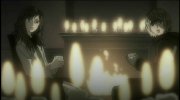


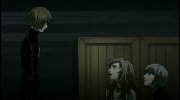
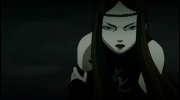
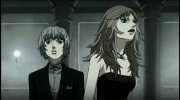
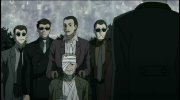
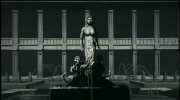
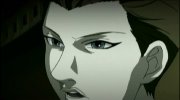


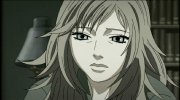


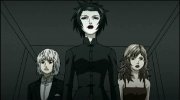
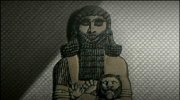
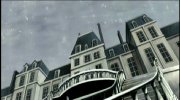
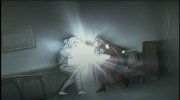
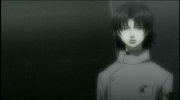

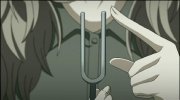
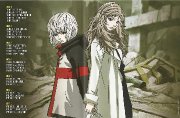
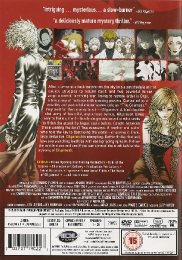






















































Your Opinions and Comments